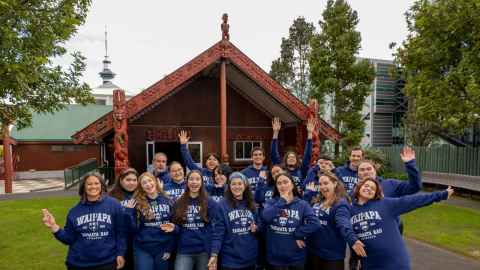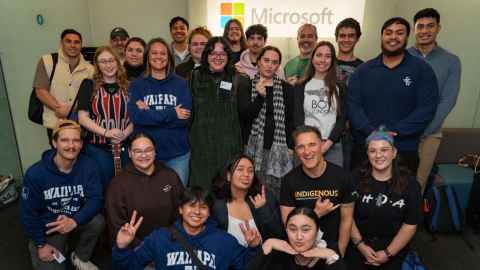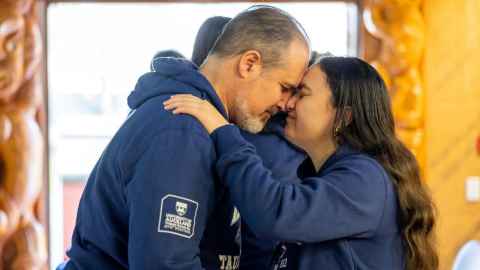Kurutao: an insight into Māori innovation
21 August 2025
A fascinating four-day tour described as ‘a buffet of Māori-led innovation’ showed students entrepreneurs’ expertise in everything from tech through to agriculture, architecture, social enterprise and … even gorse.

The Kurutao Entrepreneurial Leaders Expedition programme returned in 2025 with another inspiring array of experiences to encourage tauira Māori (students) into the world of entrepreneurship.
Organised by the Business School’s Centre for Innovation and Entrepreneurship (CIE) and open to Māori students at all levels and across all faculties at Waipapa Taumata Rau, University of Auckland, Kurutao takes participants on an eye-opening four-day expedition exploring Māori-led innovation in Aotearoa.
This year, 13 undergraduate and three postgraduate students from the faculties of Arts and Education, Science, Business, and Engineering joined University staff for a tour of Māori entrepreneurial endeavours in Tāmaki Makaurau and Te Tai Tokerau (Northland).
The contributors had expertise in so many different areas – from tech through to agriculture, architecture, social enterprise and investment. It was almost like a buffet for the students!
Kurutao began with a pōwhiri at Ngā Wai o Horotiu Marae. Students then attended a panel at Ngahere Communities in Manukau, focused on social enterprise and Māori entrepreneurial ecosystems. The day concluded with a presentation by Te Pūoho Katene, CEO of Tapuwae Roa and a Stanford graduate.
The insights shared by Katene and the panellists – who included notable Māori innovators like Kushla Okano, founder of wastewater tech company Biokū, and entrepreneurship experts like Tori McNoe, Head of Investment Programmes at UniServices – offered students a thought-provoking initiation into Aotearoa’s entrepreneurial ecosystem.
A wānanga with Dan Walker, the Global Co-Chair of Indigenous at Microsoft, was a highlight for many of the students – not only for the intel he offered on the inner workings of one of the world’s largest tech companies (fun fact: thank Dan for the ability to add macrons to keyboard letters), but also for the more details he shared about personal challenges he had faced.

“It showed the students that you can persevere through adversity,” says Maxwell. “Seeing him succeed at Microsoft enabled them to see tech as a path – one that they may not have considered previously.”
At Matakohe Architecture + Urbanism, students engaged in a hands-on session led by director Jade Kake. In 2025, Kake became the first architect in Aotearoa to complete her registration in te reo Māori. She presented a blueprint of her marae and asked students to modify it to include wheelchair access while respecting tikanga. Maxwell said this session required critical thinking and active participation, which made it especially impactful.
“They had to really think about what they were doing. It wasn’t just passive learning,” says Maxwell.
Maxwell was intrigued to discover what appealed to each student. The visit to NGEN Room, a digital tech space in Whangārei, piqued the interest of one student in particular, she recalls.
“That was the first time he started asking questions,” she says. “With some, you just needed to wait to see what resonates.”
Facilitators Dr Jamie Newth (Soul Capital), Professor Jason Mika and Neria Brewerton played a crucial role in encouraging and supporting the students on their journey, she adds.
“They knew what to say to prompt discussion and were always available to answer questions and explain concepts. Kurutao couldn’t have happened without them.”
Regardless of the activity, a key takeaway for the students was the contributors’ commitment to their mahi.
“Everyone that we visited was so passionate about their enterprise,” observes Maxwell, citing Koro Carman, founder of Green Waste Products NZ, as one inspiring example.
“Koro’s turning one of Aotearoa’s most invasive species – gorse – into a bioplastic. He could see that gorse was a problem for the Northland community, and he just fixated on solving it. The students saw the passion these Māori innovators had for the problem they wanted to solve.”
The closeness of this year’s Kurutao cohort has been a particularly gratifying outcome of the expedition for Maxwell.
“They want to stay connected, to support each other and engage in the future,” she says. “That’s one of the most important things for me – for the students to stay involved, to stay engaged and continue to learn. It means they’re getting value beyond the programme.”

Perhaps the most significant impact of Kurutao was the shift in students’ perspectives. One student shared that they had previously viewed entrepreneurship as intimidating, but now saw it as something achievable. Maxwell said this kind of transformation is what makes the programme so meaningful.
One student even updated their LinkedIn bio to ‘Emerging Entrepreneur’ after the tour.
“This is what inspires me about Kurutao – it embodies ‘akiaki’, the Māori word for encouragement. It’s that first stepping stone for students to realise their own potential.”
Contact
Questions? Contact the Centre for Innovation and Entrepreneurship for more information.
E: cie@auckland.ac.nz